Almost There: Ralph Fiennes in "The Grand Budapest Hotel"
 Wednesday, January 27, 2021 at 6:30PM
Wednesday, January 27, 2021 at 6:30PM 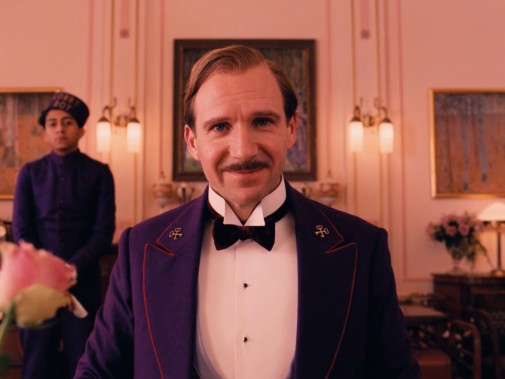
With Netflix's The Dig arriving friday, let's talk about the remarkable Ralph Fiennes. Oscar-wise, the British actor hit it big quickly, earning a nomination for his third feature, Best Picture champion Schindler's List. For a handful of years, it seemed like he'd become an awards season perennial, but things turned out differently. While he conquered another Oscar nomination for 1996's The English Patient, he's won little buzz since. That doesn't reflect a decrease in the quality of his work nor a turn to less prestigious fare. Oddly, even when he gets great reviews in titles beloved by AMPAS, an acting nomination remains elusive. This was never more evident than in 2014 when Fiennes delivered a tour-de-force in one of the most nominated movies of the year, The Grand Budapest Hotel…
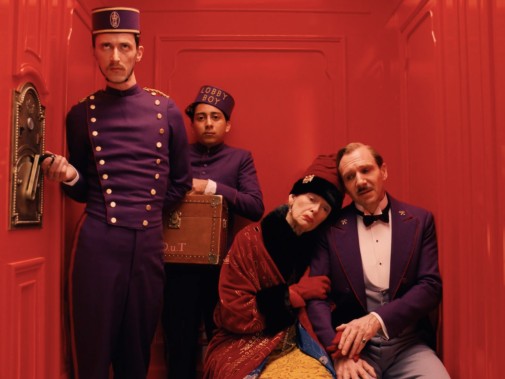
The cinema of Wes Anderson always bears the personal stamp of its creator. Between rigidly symmetrical compositions and humorous artifice, his films are like finicky desserts, sugary but with a dash of astringent flavor, so carefully put together that one can be besotted by their beauty and be repelled by it too. Since his first-ever feature, 1996's Bottle Rocket, the cineaste has been working on his singular approach, reaching new echelons of rarefied style with each project. In some ways, The Grand Budapest Hotel represents the peak of this artistic development, all its characteristics turned up to eleven. While one could grumble about airless excess, I confess myself enchanted by a film whose archness is offset by fleetfooted rhythms, lightness of tone, and just the right amount of melancholy.
It's also the best showcase for what one might call the Wes Anderson school of acting. To accommodate the director's demands, his casts have had to learn how to act outside normal paradigms. In other words, Anderson's films are as anti-naturalistic as anything in modern American cinema, going against the norms of an industry that has, long ago, adopted pseudo-credibility as its standard. His actors must play their roles in a register that fits such specific directorial choices, often opting for clipped line deliveries, overtly poised postures, and a propensity for switching between aloof inexpression and cartoonish mugging. Also important is the way they move through the frame, constricted by an aesthetic that treats them like wound-up toys with mechanized motions built-in.
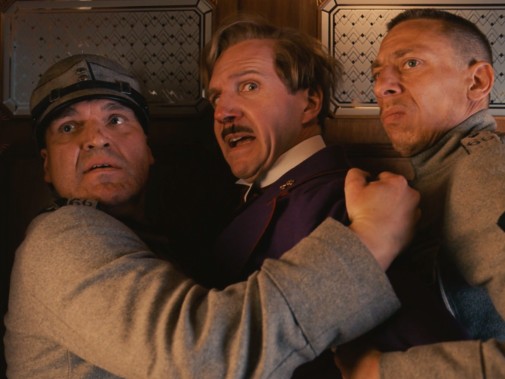
As Monsieur Gustave H., the concierge of the famous Grand Budapest Hotel, Ralph Fiennes masters the challenge of acting in Anderson's cinema as few others have. Shown to us through several layers of storytelling, the plot of The Grand Budapest Hotel focuses on the misadventures of M. Gustave and his loyal lobby boy, Zero. The older man acts as both a mentor and an aspirational figure, a mercenary Casanova whose affairs with older rich women end up causing a fair bit of trouble when one of his mistresses dies and leaves him a treasured painting. Murderous conspiracies and the rise of fascistic order propel the two heroes in an odyssey that sees them plan a prison break, infiltrate a monastery and galivant their way through an imaginary land that's somewhere between Eastern Europe and the Swiss Alps.
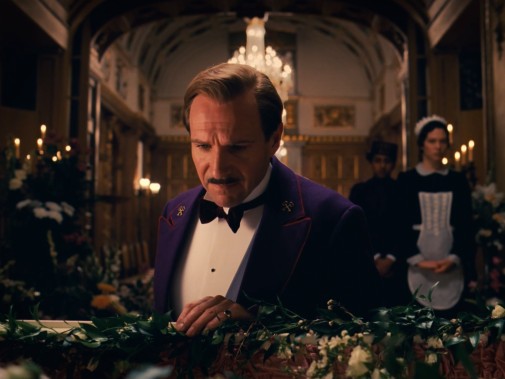
Fiennes' performance tells us everything we need to know about the concierge, hiding any extraneous details behind a flower-scented smokescreen. M. Gustave can often be a mystery wrapped around an enigma with an over-complicated bow of lace-trimmed pastel silk topping it off. Nonetheless, catch him at the right instant, and you might see something else shining through. You can also deduce enough by the way he commands the hotel. As a concierge, he's a man used to be in control of his environment. Fiennes' every gesture and theatrical tic indicate how much M. Gustave lives an existence where his charm is so powerful, his orders so respected, that his will's nearly capable of bending reality.
Unlike many of the director's other collaborators, his body moves with such ease and assuredness that we get an impression that the camera's hyper-choreographed action is motivated by the actor and not the other way around. His gait is almost dancer-like, light-footed poise making him look akin to a ghost of Fred Astaire haunting modern cinema with effete elegance. The performance is so rhythmically precise that whenever its affectations are briefly abandoned, the effect is like a jolt of electricity. The best example of this is when Gustave walks toward the police with all the serene grace in the world. Then, once he realizes the plot to incriminate him, the concierge runs away in a most inelegant manner, his sloppy escape coming off like a record scratch in the middle of a symphony. It's hilarious.
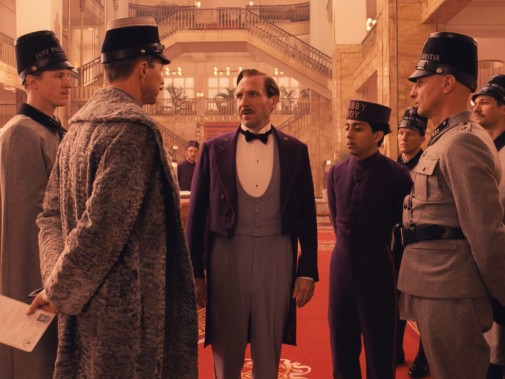
There's also the matter of his line readings, each one a work of art. He savors the words even as he spits them out in rapid-fire fashion, finding gradations of meaning and humor in every utterance. One thinks of how he says "I love you" with mechanic practice, a performer's declaration of devotion tinged with the faintest hint of sincerity, a whisper of concern. It's the behavior of an amorous mercenary, heartfelt but notably superficial. The way the actor laces obscenities into the candied dialogue also deserves attention for how it summarizes both the character and the movie's odd ethos. The Grand Budapest Hotel is all about opposite ideas considered in the same brief instant, co-existing in a harmony that tastes like French patisserie and a few drops of strychnine. Violence and harmless charm dancing together, light delight married to the inevitable gloom of death, a poet's song spiked by the tart tongue of a foul-mouthed sailor, an invisible tear running over a smiling face.
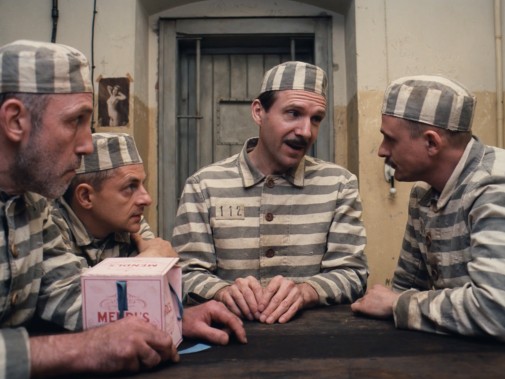
Probably my favorite aspect of Fiennes' take on M. Gustave is the sadness that permeates the characterization. Even as he projects the bon vivant allure of an insecure, vain, blonde, needy, liberally perfumed lothario, the actor allows the flavor of slight despondence to come through. Gustave's a man whose world had vanished long before he entered it. He knows the obsoleteness of the hotel that defines his life and the lifestyle it offers. Still, like a self-aware magician who lies to the man he sees in the mirror, Gustave constructs illusion and gives himself to it. It's only appropriate that one sees the inkling of ruin in the corner of his smile since he's somewhat an extension of the hotel. The building's a confection of twee architecture fated to age into an out-of-style old ruin and, in more ways than one, so is M. Gustave. Because of that, simple pleasures earn dramatic weight. Notice the ineffably wonder that blossoms in Fiennes when he bites into a courtesan au chocolat. It's wistful, beautiful, moving.
Another highlight is Gustave's talk with Zero after the prison escape. Fiennes makes a show of refined comportment crumbling under the stress of harrumphed indignation. For the first time, we see Gustave being mean to Zero, lashing out with undue sharpness that quickly turns to regret once he realizes what he's doing and the pain his friend has suffered. It's arch and cartoony, heartbreaking and heartwarming, all at the same time. A few minutes later, he's vibrating with giddiness when telling Zero about The Society of Crossed Keys. There's a glint of paternal pride twinkling in his eye, excitement bubbling over the man's obvious distress, as if the chance to save this younger friend has given him a new purpose, ignited a new light within him.
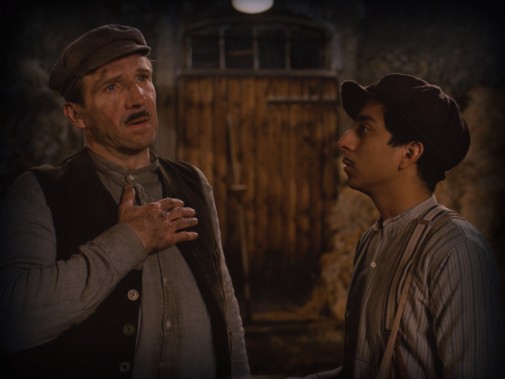
None of this is too overt or didactically shown, mind you. Ralph Fiennes isn't interested in shining a light on the effort of his craft. Furthermore, none of this is the product of an actor sneakily finding ways to undermine his movie. It's not that Fiennes goes against the film's style to find real emotion hidden in between its design. Instead, the performer evokes sentiment through the parameters of his director's formal approach, unearthing the text's essence while never betraying its strategies. In The Grand Budapest Hotel, he gives a masterclass in how overt fakery can be as good a vehicle for truth as gritty naturalism. Though originally rumoured to be played by Johnny Depp, it's difficult to imagine anyone other than Ralph Fiennes in the role of Monsieur Gustave H. He's beyond perfect.
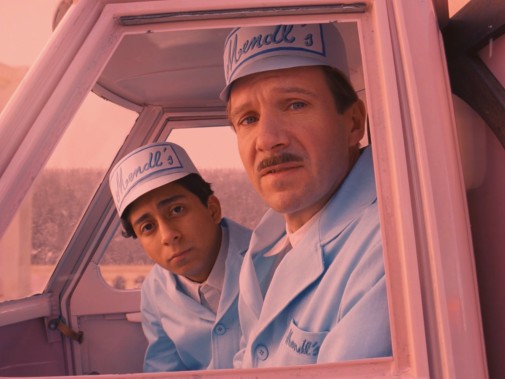
For a while, it seemed like Fiennes would be able to return to the Academy's good graces with this comedic performance. He got recognition from several precursors, including the Globes, BAFTA, and BFCA, as well as a wealth of critics' honors. Nonetheless, AMPAS chose to look elsewhere for its Best Actor lineup despite nominating The Grand Budapest Hotel everywhere else. Instead of Fiennes, the Academy voters chose Steve Carell in Foxcatcher, Bradley Cooper in American Sniper, Benedict Cumberbatch in The Imitation Game, Michael Keaton in Birdman, and, the winner, Eddie Redmayne in The Theory of Everything. The most vulnerable of that quintet, the only one not starring in a Best Picture nominee, is Carell and I wouldn't think twice about replacing him with Fiennes. What does the British thespian need to do to get a third Oscar nomination?
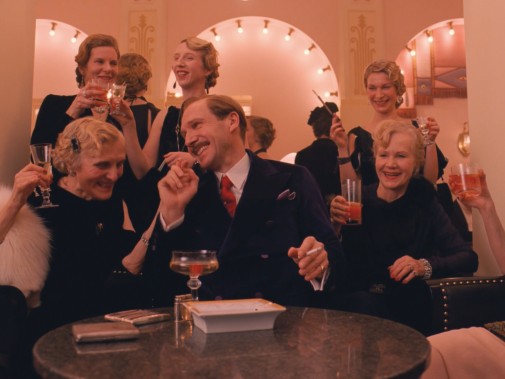
The Grand Budapest Hotel is available to rent from most services.



Reader Comments (26)
I'd replace the affectations of Eddie and Benedict but definitely not the much maligned Steve for this role,Cooper is fine and I am not the biggest Birdman fan but Keaton was great.
This is a great write up of the too often overlooked Fiennes and he should have won but AMPAS went for Clint again.
Ugh, Fiennes was so robbed here. And American Sniper was such a piece of dogshit, too. I still can't believe it got any nominations, let alone top categories.
He was also fantastic in A Bigger Splash, but he was completely ignored for that performance.
Could there be a bias against performances in a Wes Anderson film? Gene Hackman also missed an Oscar nomination for The Royal Tennenbaums (and he won a Golden Globe for it)... or maybe it was just very competitive that year in Best Actor. Personally, I would have given Fiennes the win for this (also for Schindler's List).
Fiennes is funny and sad at the same time.
It was a very tough category, but I would replace Redmayne and Cooper for Fiennes and Gyllenhall (my winner)
Other great performances by Fiennes without an Oscar nomination:
Spider (2002)
The constant gardener (2005)
The duchess (2008)
And of course, he was robbed in 1993 for Schindler's list (he's so much better than Jones)
That neither Fiennes nor Jake G. got nominations that year was terribly disappointing.
his performance towers over of all the eventual nominees
which is also true of the film, direction and screenplay
Replace him and Oyelowo with Redmayne and Cumberbatch (both of whom I like a lot) and it’d be a perfect lineup. Best Actor was so stacked in 2014 and still Fiennes is quite handily my winner for the year. Such a soulful, ingeniously calibrated performance.
Horrifically, terribly robbed... the sort of snub where years later you just assume the person was nominated because, "How could AMPAS not have nominated that?"
Ralph Fiennes should've been nominated as I would've called a tie for him and Michael Keaton. My dad wasn't into Wes Anderson but he did like Fiennes a lot. He still hated Eddie Redmayne.
Great essay, and it makes me think about the actors (Swinton, McDormand, Clooney, Gambon, Fiennes et al.) and the acting style embraced by both Anderson and the Coens. Not everyone can swim in those waters.
Vale Cloris.
Actors at the Academy and SAG are reluctant to acknowledge Wes Anderson ensembles and standout solo performances. Can you really argue he was almost there with their history of resistance?
this is one of the most baffling snubs of the century so far, especially when the movie itself was a huge hit among voters with 9 nominations and 4 wins
and he's better than 80% of that Actor lineup
I would have given him the win much like Gene Hackman deserved it for The Royal Tenenbaums and Bill Murray for Rushmore. I wonder if actors in Wes Anderson’s movies will ever get the respect they deserve.
Would that it were..
My 2014 winner - Fiennes, Gyllenhaal and Tatum were all exceptional in films on voter radars and were inexplicably ignored... of the actual nominees only Cumberbatch makes my Top 10 (with Keaton just outside it).
Such a strong year and the Best Actor line-up doesn’t reflect that...
I just googled his name and I found out he just turned 58 years old. can you believe it ? he still young and energetic. Many of you may not know that He began his career at the Open Air Theatre "Regent's Park". its written in his personal Wikipedia page ! i can bet you will be shocked by knowing by knowing that Theatre ( Regent's Park ) is also 58 years old.
He should have won. And Hackman should have won, too. (And Bill Murray should have won for Rushmore.)
Nicely done! This is one of my favorite films, and I have never heard that Johnnie Depp had been first choice. In fact, i saw a promotional interview with Wes Anderson and he stated that he had always wanted to work with Ralph Fiennes and had written the part of Gustave with him in mind. Maybe you should research that a little more.
Dr. D -- Maybe I should have phrased it better, it's true. However, despite Wes Anderson's later corrections, Johnny Depp was indeed announced as the lead of the film months before Ralph Fiennes was confirmed as Gustave. In any case, thank you for the feedback and the correction.
At first it said "Originally offered to Johnny Depp", but, after reading your comment, I've changed it to "Though originally rumoured to be played by Johnny Depp". Hope it feels more accurate now.
Great article, and this fully sums up my own appreciation of Ralph Fiennes and exasperation at The Academy. What fools they are to ignore one of the best performances seen that year.
But let's set aside their stupidity for a moment, and bask in this elegant and superb performance.
Fiennes did it all in this role, he brought comic chops, physical comedy, wit, and sorrow.
His problem is that he makes it look too easy. He doesn't make a big deal about his method, (like Daniel Day Lewis) He's always very watchable, but doesn't make a fuss or do a lot of interviews.
Btw. I just saw him last night in "The White Crow", he directed and acted in this excellent drama about Rudolph Nureyev'.
Johnny Depp? I shudder.
I was thinking who could have played this besides Ralph Fiennes and I thought of Christoph Waltz who is awfully good at the hammy stuff, but I'm not so sure about the sadness. But talk about (over?) rewarded at the Academy.
My other thought was Hugh Grant who I really think could have been up to this role, but the Academy values him even less than Ralph Fiennes.
Not only here, but the Academy's contempt for Fiennes' exceptional performances in the 21st century are outrageous. In addition to the obvious victory for “Schindler's List” in 1994 (I never really cared for him in “The English Patient”), I would have nominated him for “The End of the Affair”, “The Constant Gardener”, “In Bruges” “ The Grand Budapest Hotel ”and“ A Bigger Splash ”. And it's even worse when you realize that most of these films have been embraced by the Academy in other categories.
Imo, Fiennes kinda fall outta Oscar favor after his ahem indiscretion on board a plane w a stewardess got blown outta proportion!
He shld've won for Schindler's List! TLJ shld've won for Lincoln instead...
markgordonuk -- I think Fiennes is better than all of the nominees, tbh. Glad you enjoyed this write-up, it was great fun to re-watch the movie and Fiennes' delightful star turn.
Richard -- The critical love for AMERICAN SNIPER has been confounding me for years.
Rod -- Absolutely brilliant. I'd have nominated him for that one too.
Richter Scale -- AMPAS doesn't like purposefully artificial acting styles.
Cafg -- One of these days, I might write about him in THE DUCHESS.
ScottC -- Oyelowo too.
par -- Agreed.
Nick Taylor -- I co-sign these changes to the Oscar lineup.
Working stiff -- Thanks for the compliment. Glad you enjoyed the write-up.
/3rtful -- With all those precursors, yes I can.
eduardo -- He's better than 100% of that lineup, IMHO.
kermit_the_frog -- I also love Tatum's performance. He's in my 2014 Best Actor ballot too.
LadyEdith -- Making it look easy seems to be a cardinal sin, as far as AMPAS is concerned.
Henrique Perez -- In the past two decade, he has been in an obscene number of Oscar nominated films and still received no love for his consistently great work.
Claran -- I too prefer that change in the Best Supporting Actor Oscar history.
Thank you for all the feedback. It's always appreciated.